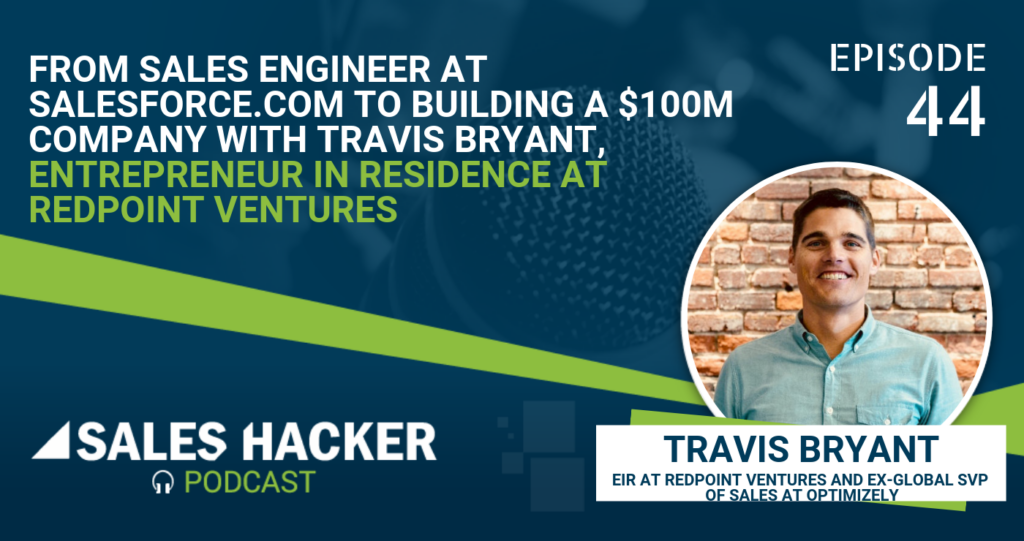This week on the Sales Hacker podcast, we talk to Travis Bryant, Entrepreneur in Residence at Redpoint Ventures and former global head of Sales at Optimizely.
Travis began his career designing web portals for car dealerships before joining Salesforce as a Sales Engineer. He rose up the ranks before moving on to Optimizely where he helped take the company from $7M in ARR to just shy of $100MM.
If you missed episode 43, check it out here: PODCAST 43: Why Endurance and Tenacity is Important for Sales Success w/ Carson Heady
What You’ll Learn
- What is a Sales Engineer and how do SEs work together with Account Executives
- How do you know you are going to be a great manager?
- What’s the difference between $0-50M and $50M-$100M
- Using “inspectable events” to create forecastable deals
- Why enterprise sales is a team sport
Subscribe to the Sales Hacker Podcast
Show Agenda and Timestamps
- Show Introduction [0:09]
- About Travis Bryant: An Introduction [3:26]
- How to Know if You Need an Account Executive or a Sales Engineer [8:55]
- Evolving From Individual Contributor to Manager of Managers [14:53]
- Productive Accountability is the Mark of a Great Manager [20:23]
- Inspectable Events and What it Takes to Go From 50 to 100 Million [36:00]
- Sam’s Corner [50:11]
Sales Hacker Podcast—Sponsored by Chorus and Outreach
Sam Jacobs: Hello friends, it’s Sam Jacobs, and you’re listening to the Sales Hacker podcast. We’ve got a great show for you today. We’ve got Travis Bryant, who has had sales leader positions at Salesforce and Optimizely and is currently an entrepreneur-in-residence at Red Point Ventures.
He talks about what it takes to be a great manager, what are the differences in stages of company, and the difference in taking that company from 50 to 100 million. I really, really liked chatting with him.
Before we get to the interview, we’ve got to thank our sponsors. The first is Chorus.ai, the leading conversation intelligence platform for high growth sales teams. Chorus records, transcribes, and analyzes business conversations in real time to coach reps on how to become top performers.
Our second sponsor is Outreach.io, the leading sales engagement platform. Outreach supports sales reps by enabling them to humanize their communications at scale from automating the soul sucking manual work that eats up selling time, to providing action oriented tips on what communications are working best.
Two more announcements. Outreach is running Unleash 2019, the sales engagement conference. Hop over to unleash.outreach.io, and use the code SHPOD to save $100 off your ticket. I’ll be there, it’s gonna be great.
Finally, have you nominated yourself or your peers for the Sales Hacker Top 50 Awards? Winners will be featured on this podcast and receive other very exciting prizes, including the recognition and praise of the Sales Hacker community, which, unfortunately, feels great, but can’t pay your bills. You can nominate at saleshacker.com/nominate.
Without further ado, let’s listen to Travis Bryant.
About Travis Bryant: An Introduction
Sam Jacobs: Hey everybody, it’s Sam Jacobs, and today we’re incredibly excited to have Travis Bryant. Travis is known for his five years as the SVP of global sales at Optimizely, six and a half years at salesforce.com, and really well respected and connected in the Bay Area as a sales leader. He also runs his own sales consulting group called Sales Human Consulting Group. Right now, he is an entrepreneur-in-residence at Red Point, so probably incubating and formulating some kind of amazing new idea. Travis, welcome to the show.
Travis Bryant: Sam, thanks for breaking cardinal rule number one of “under promise and over deliver.” I’m not sure how we’re gonna go from here.
Sam Jacobs: Let’s talk about the highlights of your career and go through a bit about your background and how you got started in the world of sales.
Travis Bryant: Bit of a bizarre path, I suppose. I was a really poor Oracle DBA and Java developer at Chevron when I started my career, building websites for the gas station owners to log in and get their invoices from SAP.
I realized that I wasn’t a great natural developer, but I had somewhat of a knack for explaining what the product did.
The magic of sales engineering and the ability to frame a technical solution to a customer problem in a way that resonates with them is, I think, some version of alchemy, and I got a lot of energy from that. And being at Salesforce, before the cloud was even a term, was really powerful in that we felt this energy around helping people run their businesses better in a fundamentally different way.
How to Know if You Need an Account Executive or a Sales Engineer
Sam Jacobs: How do you define where the account executive role ends and where the sales engineer begins, and how they should interact with each other?
Travis Bryant: The role of a sales engineer really ends up being this combination of business aptitude and technical aptitude, but there’s still a relatively short supply of people that can do that translation. It’s this ability to understand what the customer is trying to accomplish at a company level, and at a personal level, and translate that to the features and functions, but more importantly, the results that can come from the product that they are offering. They’re a broker of that connection.
That, in theory, also should be what an AE is responsible for.
The AE should be curious, they should have that drive to understand the business opportunity and whether the capabilities of a product can meet that.
I would characterize the difference there is my expectation of AE’s is always that they have an undergraduate degree in the technical capability, and when you need that graduate student level of detail, that is where a SE can provide that.
One of the challenges of conversations like these is you can come across as fairly generic because it really does vary market to market and product to product.
RELATED: 10 Tips to Build Rapport Internally to Navigate Complex Deals
Evolving From Individual Contributor to Manager of Managers
Sam Jacobs: One of the big questions from the audience is moving from individual contributor to manager. And the second is moving from manager to manager of managers. So how did you know that you wanted to be a manager, what were some of the lessons that you learned, walk us through that evolution as you went from individual contributor up the ladder.
Travis Bryant: The trick for any of us in our careers is to find that thing that you would do even if you weren’t getting paid.
It sounds cliché, but that’s the energy that sustains, especially in startups, when your everyday feels like either wild success or abject failure.
So every time you move from a role, there’s always a question. You can’t really know it until you do it. For me, the first question was going from SE to AE–was that something where I was giving up what I really loved, and was I gonna get enough of that genuine energy?
1. Ask “Am I going to get the same feed from not making it about me but making it about the folks on my team?”
The question about moving from IC to manager, the biggest change, is the way that we architect these roles in organizations like the world has to revolve around you. You get this ego feed of you’re the person that caught the touchdown and carried it across the goal line, even though every single person in the organization was involved in getting that ball from the quarterback’s hand into your hands.
2. Define “manager” well.
A great manager is someone who chameleons theirselves to what that individual person needs on their team to maximize their potential. Everyone is a snowflake, super unique and different, and you have to be able to intuit that and mold yourself to what they need so that they do their best work. That to me is the mark of a great manager.
Productive Accountability is the Mark of a Great Manager
Sam Jacobs: What do you think the other tenets of being a great manager are besides empathy or drawing energy from other people’s success? When you think about the skills that are required to be a really effective manager, growing into a VP of sales, what are the key tenets?
Travis Bryant:
Productive accountability – There’s goals that are leading indicators that need to be managed, and people held accountable against, to lead to that ultimate goal of target attainment.
And I don’t mean it even necessarily from an activity perspective or pipeline generation perspective. You’re here because you wanna be great. Let’s talk about the behaviors and competencies and frequencies of those behaviors that you need to get there.
You’re setting those goals as an individual–I’m not necessarily setting them as a manager. We might have team goals that everybody has, but in that individual chameleoning, tell me what your goals are, and my job as coach is to hold you accountable to those things that you told me you wanted to do in the first place.
There is a discipline that’s beyond the empathy and how to create the environment that maximizes people’s potential, but let’s add the cold rationality of we work at places that have specific goals that are enterprises to make money, and we all have a responsibility to play in that.
I’m here to hold you accountable to the things that the company needs you to do, and you told me you want to accomplish because you have aspirations for performing in this role and of course developing into other roles as you grow your career.
Inspectable Events and What it Takes to Go From 50 to 100 Million
Sam Jacobs: 36:00 If you were to split your personality, or split whatever the skill sets were at the 50 to 100 versus the zero to 50 using very, very rough framework, what do you think is different about taking a company at that level of 30 to 50 up to 100 then is different from maybe seven to 30?
Travis Bryant:
Being comfortable with any level of altitude – And I talked a lot about not being the executive guy that’s like, “Look, I’m not gonna get on that call, or I’m not gonna jump on that lead, because I’m big picture, strategic thinker.” That stuff is super dangerous, because at some point we all got work to do, and we gotta get to work.
You can’t be high level forecast and strategy guy, you’ve gotta be willing to get into the muck.
Identify you inspectable events – These binary and objective components in the sales cycle that are not what the rep does to the customer, but how the customer responds. The more that you can flesh out a common set of those, the more that you can inspect every deal against those, and then have more predictability of whether these deals are on track or not.
That, to me, is an example of this programmatic or systematic framework work that you have to do to get the repeatability so that the 10th rep to the 100th rep that you hire understands what those inspectable events are, is trained against them, is held accountable against them, and that willingness to work on bigger problems and try to get ahead of those as best you can is what helped me hold onto the job.
Sam’s Corner
Sam Jacobs: Hello everybody. You are listening to Sam’s Corner. Thank you so much. What a great interview with Travis Bryant, a really thoughtful leader, somebody that chooses his words carefully and drops a lot of really valuable nuggets.
- Do you get joy when other people succeed? Do you get joy when other people win or do you feel threatened when other people win? Every time somebody interacts with you, they’re asking are you self interested or are you interested in my personal well being and success? So if you are interested in other people’s success, that’s one of the key psychological criteria for whether or not you’re gonna be a great manager.
2. Inspectable events. Distilling your sales process down to discreet, measurable things that the customer does, not that you do, but that the customer does, that you can use to understand whether you’re on the right track and whether you can go to commit. Signals from the customer that are measurable, that map to their buyer journey, not necessarily to your selling journey.
3. Enterprise sales is a team sport. There’s no single person, within the big enterprise sale, that closes the deal all by themselves. It is a team sport, so you have to be thinking about it from that perspective. You have to be giving encouragement, you have to be sharing accolades and kudos. You can’t be a hero, you have to be focused on working collaboratively as a team.
This has been Sam’s Corner. Thanks so much for listening.
Don’t Miss Episode 45
Now, if you wanna check out the show notes, see upcoming guests, play more episodes from our incredible lineup of sales leaders, visit gtmnow.com/listen/. You can also find the Sales Hacker podcast on iTunes or Stitcher. If you enjoy this episode, please share it with your peers on LinkedIn, Twitter, or elsewhere.
If you’ve got a great idea or a guest for the show if you wanna get in touch with me, find me on Twitter or on LinkedIn. Finally, thanks again to our sponsors. Chorus, the leading conversation intelligence platform for high growth sales teams, and Outreach, the leading sales engagement platform.
I’ll see you next time and I hope to see you in San Diego at Unleash.







